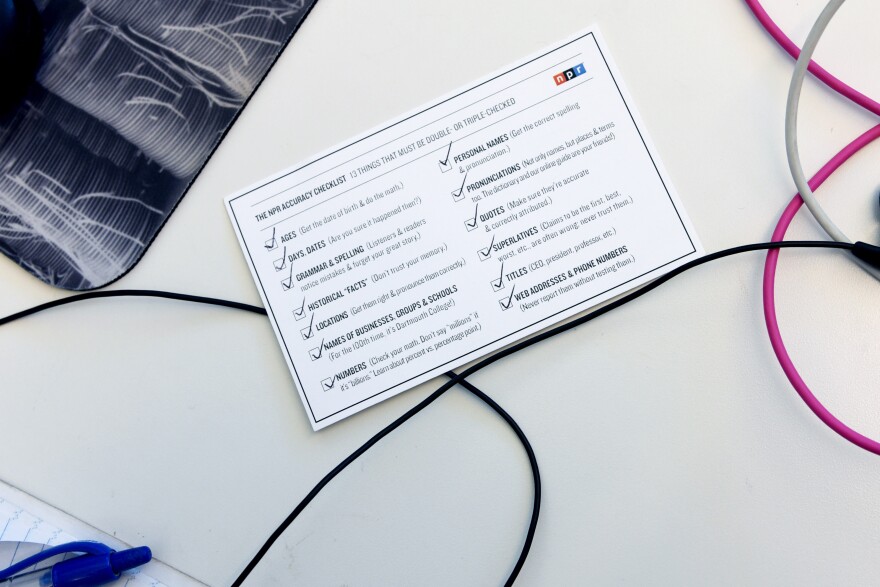The checklist that follows is a reminder of things we all know we should do. It’s meant to be particularly useful to correspondents and producers. They collect the information we put on the air and online and they are expected to do all they can to make sure that what we report is accurate.
Think of the checklist as a tool. Print a 3?x5? copy for yourself and please use it. We know we will make mistakes. But we all need to do what we can to reduce them.
13 things to double-check
- Ages — Get the date and birth — and do the math.
- Days, date — Are you sure it happened then?
- Grammar and spelling — Listeners and readers notice mistakes and forget your great story
- Historical “facts” — Don’t trust your memory.
- Locations — Get them right and pronounce them correctly.
- Names of businesses, groups and schools — For the 100th time, it’s Dartmouth College.
- Numbers — Check your math. Don’t say “millions” if it’s “billions.” Learn about percent vs. percentage point.
- Personal names — Get the correct spelling and pronunciation.
- Pronunciations — Not only names, but places and terms, too. The dictionary is your friend!
- Quotes — Make sure they’re accurate and correctly attributed.
- Superlatives — If something is said to be the “first,” “last,” “best,” “worst,” “only,” “oldest,” “youngest” etc., that claim must be verified. If it can’t be, the claim should be deleted or qualified – and clearly attributed.
- Titles — President, CEO, professor, etc. They must be accurate.
- Web addresses and phone numbers — Never report them without testing them first.
When an NPR journalist says something is ready for editing, that journalist is confirming that all such double-checking has been done. If something hasn’t yet been nailed down, the journalist will alert the editor. When news is breaking and we’re covering it live, NPR journalists make clear what is “known” and what is ”not known.”
NPR editors
– Will ask: Has everything that needs to be double-checked been double-checked?
– Will still check: The accuracy of the reporting.
When mistakes are made
– We own them. This is important: If you realize a mistake has been made, email corrections@npr.org and notify the appropriate editor or producer. Senior managers need to be told about “serious” mistakes.
Mark Memmott is NPR’s Standards & Practices Editor. A version of this post originally appeared in one of his “Memmos.”
NOTE: This applies to stories you create for WNIJ -- or any news outlet. Check everything for accuracy and notify an editor or supervisor as soon as possible if you discover an error.


